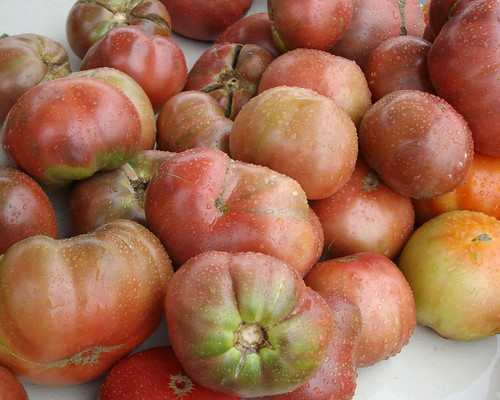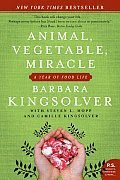Although all BCB yarn is eco-friendly, my first priority is always to find the most local fiber. Today I'll cover the locavore lifestyle and tomorrow we'll talk about what that means for yarn.
So, What's a Locavore?
"Locavore" refers to someone who is committed to eating locally: local veggies, local meat, local dairy. I'm blessed to live in a very agricultural area with a long growing season. For 9 months out of the year, I have ready access to fresh fruits or veggies at the local farmer's markets. Since my husband is a vegetarian and we don't make any meat at home, I don't worry about local meat. However, there is a nearby butcher who buys some of his meat locally and the bakery down the street smokes meat and fish that they've caught. They also make and smoke an excellent turkey sausage. I found dairy products to be the hardest to buy directly from the farmer's, due to legal issues. For eggs, we buy Appalachian Harvest eggs at the grocery store. They are a distributor that collects eggs from many local farms and then packages them and sells them in traditional grocery stores (like my Kroger). We occaisonally get some goat's cheese from Oak Moon Creamery, a local goat farm, but I'm still looking for cow's milk and cheeses.
How did I become a locavore?
Raised to eat fresh food, my mom often bought meat, bread and dairy from our Amish neighbors. I've always loved Farmer's Markets and farm visits but just in the last year I've become more passionate about supporting local agriculture. For me, it's not about the food, although there are plenty of reasons local food is better; it's about buying directly from the person who grew it. It's about giving back to my community.
Reading Barbara Kingsolvers' Animal, Vegetable Mineral solidified this from a preference to a passion. In this book, the author and her family commit to eating locally for one year. They have a big garden and preserve a LOT of food to get them through the winter. They also rely on their neighbors for diary and some meat. Kingsolver writes about her connection with the land and her community in a way that is touching and compelling. The book is full of practical advice and she doesn't gloss over the hours of hard work (or the inevitable "harvesting" of her turkeys).
Interested in finding local food?
LocalHarvest simplifies finding farms and stores that carry local produce. Just search your zip code or for a product. This is the best "local" database I've found, at least for my remote corner of Tennessee!
The Eat Well Guide is similar to Local Harvest, but without the huge database of self-added farms (again, this is just in my area). It has an advantage with it's 'Plan a Trip' function which allows you to find restaurants and markets during any road trip! I plan to use the next time I visit my in-laws in Ohio...although I'm very familiar with the highways, I don't know of ANY non-chain restaurants to eat it.

In Defense of Food - If you're wondering why local food might be better, this is the answer. Less gas to transport, fewer additives, all-aournd less of the bad stuff, more of the good stuff. Except, you know, in more scientific words. Everyone I've shared this book with thought they wouldn't like the book (is it too diet-y? or science-y?) but ended up loving it.
Do you eat locally? Why? Any resources that help you?




